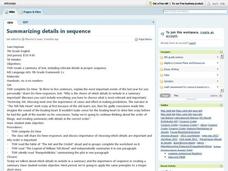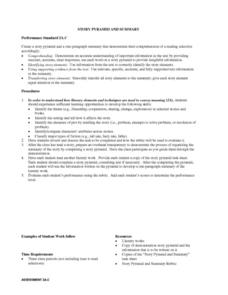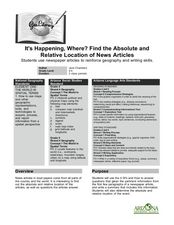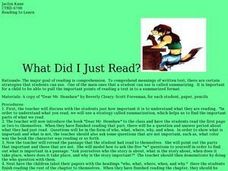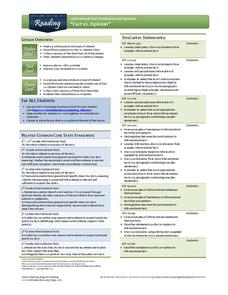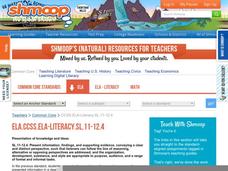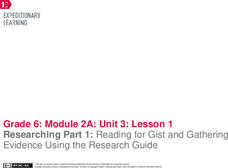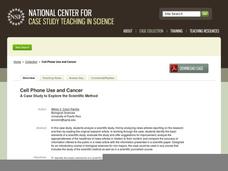Curated OER
Main Idea in Informational Text
Individuals complete a pre-assessment to gauge their ability to determine the main idea and supporting details in nonfiction text. They examine a new piece of nonfiction reading by looking at the table of contents, headings, and index...
Curated OER
Summarizing Details in Sequence
Seventh graders write a few sentences explaining the most important events of their lives during the past year. As a class, they discuss why they chose the elements they did for their sentences. To end the lesson, they read a variety of...
Saddleback College
How to Find the Main Idea
What's the difference between the main idea of a text and the topic? Take kids through the process of literary analysis with a presentation about finding the main idea and supporting details. Additionally, it guides learners through...
DePaul University
Settlement
Early settlers in the American Midwest experienced constant struggle. This reading passage describes for young learners the hardships of homesteaders as they journeyed west and sought to start a new life. When finished, students identify...
Curated OER
What Was That All About?
Through direct instruction, the teacher demonstrates how to identify the main idea and supporting details of a text when creating a summary. As a class, read a paragraph, highlighting relevant information and crossing out extraneous...
Curated OER
Only the Facts
Practice the strategy of summarizing to gain meaning and knowledge from an informational text. Young readers highlight supporting details and main ideas, and then they use this to summarize two articles: "The Great Quake" and "What is an...
Curated OER
Story Pyramid and Summary
Students read a short selection of a story individually or as a class. On their own, they create a story pyramid for the selection and write a one page summary. They use text from the story for their supporting details. To end the...
University of Kansas
Newspaper in the Classroom
Newspapers aren't only for reading—they're for learning skills, too! A journalism unit provides three lessons each for primary, intermediate, and secondary grades. Lessons include objectives, materials, vocabulary, and procedure, and...
Curated OER
It's Happening, Where? Find the Absolute and Relative Location of News Articles
Pupils read newspaper articles. In this social studies lesson, students locate the latitude and longitude of the location where the news article takes place. Pupils write a summary of the news article.
Curated OER
The Chocolate Touch
Students read a book. In this story elements lesson, students share their favorite food, predict what the story will be about and discuss how they would feel if they got to eat their favorite food everyday. Students read the book The...
University of Minnesota
Dendritic Spines Lab
This is your brain on drugs ... literally! Your neuroscientists-in-training examine the evidence of drug use on the human brain and how neurons change their connectivity when altered by drugs. They then work together to create testing...
Curated OER
What Did I Just Read
Fourth graders write a summary for each chapter as they read a novel. They summarize the author's purpose and point of view after completing the novel. They also describe about how the author's point of view affected the novel.
Channel Islands Film
Santa Cruz Island Restoration Narrative
What would you be willing to do to save an animal from extinction? After re-viewing a video about the restoration of the Island Fox on Santa Cruz Island, individuals adopt the point of view of one of the key players in the debate and...
For the Teachers
Fact vs. Opinion
Many informational texts are written as factual, but can your learners determine when an opinion is presented as fact? Have your kids read several articles on the same topic and record the statements that contain either facts or...
Curated OER
Express Yourself Lesson Seed 3
If you're looking to set your class up for writing effective arguments, try out this idea. While originally created with freedom as a guiding idea, the activity could easily be adapted for other themes. As a class, create a chart of...
Curated OER
Researching the Past
Learners research the western movement in order to learn note taking strategies with nonfiction texts. They use the Internet to search for important information about the western movement using the Cornell Notes note-taking system. They...
Shmoop
ELA.CCSS.ELA-Literacy.SL.11-12.4
Study allusions with a research and presentation project. Pupils are assigned a specific allusion, the phoenix for example. They research the origins, compose a summary, explain the concept, and explore this allusion within various...
EngageNY
Researching Part 1: Reading for Gist and Gathering Evidence Using the Research Guide
If only life came with an owner's manual. Pupils assemble with their research teams to discuss which of Steve Jobs' rules to live by most resonates with them. Scholars also read informational texts in pursuit of finding the gist and...
Santa Barbara City College
Structure of a General Expository Essay
A great student reference tool and graphic organizer in one worksheet! Young writers can read a detailed description of each section of a standard five-paragraph essay before completing a graphic organized with their own writing. The...
Scholastic
Holes Match 'Em Up Challenge
Upper graders read the book Holes as a class or by themselves. In groups, they identify symbols and discuss how they are connected among the many plots in the story. They create a timeline in which they sequence the main events to end...
Curated OER
Avoiding Consumer Fraud: Financial Scams and Schemes
Young consumers get a hefty dose of information on how fraud can put their financial health at risk. The resource provides detailed lecture notes, scaffolded notetaking sheets, vocabulary worksheets, transparencies, and seven links to...
Curated OER
Claims in "The Crisis, No. 1"
"The Crisis, No. 1" is the focus of a series of exercises that ask learners to read closely and annotate Thomas Paine's text. Groups identify claims and evidence in the essay and present their arguments to the class. Teacher background...
National Center for Case Study Teaching in Science
Cell Phone Use and Cancer
The cell phone you're using is making you deaf: news at 11:00. Oftentimes, the media uses fear tactics and other techniques to increase its audience base. In an intriguing look at the difference between scientific journals and...
Curated OER
Main Idea in Informational Text
Readers identify main ideas and supporting details using informational texts. In this literacy lesson, they make predictions and read the text to find the main ideas. They use a table diagram to define the main idea and supporting...



